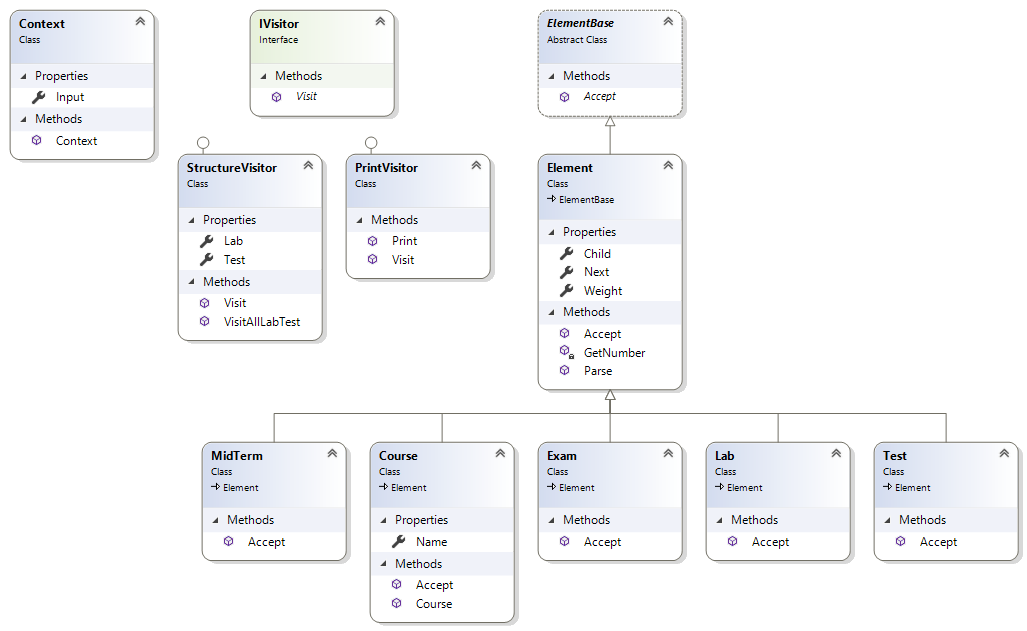Visitor Pattern
Description:
» The Visitor pattern defines and performs new operations on all the elements of an existing structure, without altering its classes;» The Visitor pattern is intended for object structures, so it is often used in conjunction with the Composite pattern; the Composite pattern is responsible for setting up the multilevel structure on which the Visitor pattern then operates.
Use When:
» You have a class hierarchy that is effectively sealed;» There are many distinct operations to perform on it;
» You need the flexibility to define new operations over time.
//Define the Pattern Interface and Handler Objects.
//Define the IVisitor interface to be used as the "blueprint" for the main application classes.
//This interface defines the Visit() method, which accepts the object to be visited as a parameter.
public interface IVisitor
{
void Visit(Element element);
}
//The PrintVisitor class (object) invokes the Accept() method on the class (object) to be visited.
//The visited class, in turn, invokes the Visit() method on the PrintVisitor class.
//The Visit() method contains the process (code) that needs to be executed against the visited class (object) each time the object is visited.
public class PrintVisitor : IVisitor
{
public void Print(Element element)
{
element.Accept(this);
if (element.Child != null)
{
Console.Write(" [");
Print(element.Child);
}
if (element.Next != null)
{
Print(element.Next);
Console.Write("] ");
}
}
public void Visit(Element element)
{
Console.Write(" {0}", element.Weight);
}
}
//The StructureVisitor class (object) invokes the Accept() method on the class (object) to be visited.
//The visited class, in turn, invokes the Visit() method on the StructureVisitor class.
//The Visit() method contains the process (code) that needs to be executed against the visited class (object) each time the object is visited.
public class StructureVisitor : IVisitor
{
public int Lab { get; set; }
public int Test { get; set; }
public void VisitAllLabTest(Element element)
{
element.Accept(this);
if (element.Child != null)
{
VisitAllLabTest(element.Child.Next);
}
if (element.Next != null)
{
VisitAllLabTest(element.Next);
}
}
public void Visit(Element element)
{
if ((element.GetType() == typeof(MidTerm) || element.GetType() == typeof(Exam)) && element.Child == null)
{
Test += element.Weight;
return;
}
if (element.GetType() == typeof(Lab))
{
Lab += element.Weight;
return;
}
if (element.GetType() == typeof(Test))
{
Test += element.Weight;
}
}
}
//Define the IVisitor interface to be used as the "blueprint" for the main application classes.
//This interface defines the Visit() method, which accepts the object to be visited as a parameter.
public interface IVisitor
{
void Visit(Element element);
}
//The PrintVisitor class (object) invokes the Accept() method on the class (object) to be visited.
//The visited class, in turn, invokes the Visit() method on the PrintVisitor class.
//The Visit() method contains the process (code) that needs to be executed against the visited class (object) each time the object is visited.
public class PrintVisitor : IVisitor
{
public void Print(Element element)
{
element.Accept(this);
if (element.Child != null)
{
Console.Write(" [");
Print(element.Child);
}
if (element.Next != null)
{
Print(element.Next);
Console.Write("] ");
}
}
public void Visit(Element element)
{
Console.Write(" {0}", element.Weight);
}
}
//The StructureVisitor class (object) invokes the Accept() method on the class (object) to be visited.
//The visited class, in turn, invokes the Visit() method on the StructureVisitor class.
//The Visit() method contains the process (code) that needs to be executed against the visited class (object) each time the object is visited.
public class StructureVisitor : IVisitor
{
public int Lab { get; set; }
public int Test { get; set; }
public void VisitAllLabTest(Element element)
{
element.Accept(this);
if (element.Child != null)
{
VisitAllLabTest(element.Child.Next);
}
if (element.Next != null)
{
VisitAllLabTest(element.Next);
}
}
public void Visit(Element element)
{
if ((element.GetType() == typeof(MidTerm) || element.GetType() == typeof(Exam)) && element.Child == null)
{
Test += element.Weight;
return;
}
if (element.GetType() == typeof(Lab))
{
Lab += element.Weight;
return;
}
if (element.GetType() == typeof(Test))
{
Test += element.Weight;
}
}
}

//Define the Context Object.
//The Context class (object) is a simple class that stores that input data to be used by the Element base class (object).
public class Context
{
public string Input { get; set; }
public Context(string c)
{
Input = c;
}
}
//The Context class (object) is a simple class that stores that input data to be used by the Element base class (object).
public class Context
{
public string Input { get; set; }
public Context(string c)
{
Input = c;
}
}